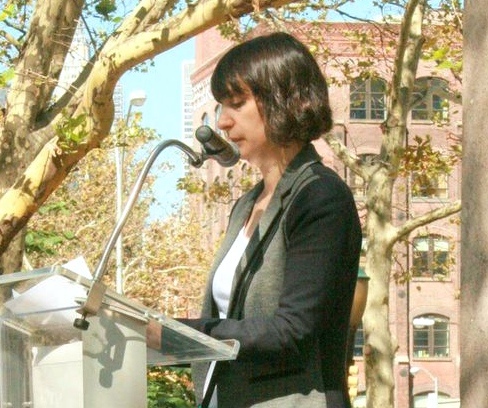
Cherie Acerno
US, US, US
Cherie Acerno delivered a stirring speech at the 2014 Walk for Lymphedema & Lymphatic Diseases at Cadman Plaza Park, Brooklyn, in front of hundreds of lymphedema and lymphatic disease advocates and fundraisers. Ms Acerno's father, Morton Weitzner, developed lymphedema as a teenager and battled the disease throughout his life. His struggle inspired his sister, Dorothea Weitzner, to sponsor research fellowships in the causation, prevention, diagnosis and treatment of lymphedema. The Weitzner Family Bequest is currently funding two two-year research fellowships, and will fund many more in years to come. Recently, thanks to this bequest, research proposals from the University of Uppsala and University of Queensland were selected to receive funding to study the pathology of lymphedema. In tribute to her father, and as the representative for the HENRY M. WEITZNER, EDNA K. WEITZNER, DOROTHEA M. WEITZNER AND MORTON L. WEITZNER RESEARCH FELLOWSHIPS, Ms. Acerno told her story at the 2014 Walk for Lymphedema & Lymphatic Diseases in Cadman Plaza Park, Brooklyn. This is her story.
**
I am so happy to be standing here today, in solidarity with people who live with lymphedema, helping to raise awareness of this disease which is so common and yet so hidden.
My father, Morton Weitzner, developed lymphedema in 1938 at age 13, after an unnecessary medical procedure. At first the lymphedema was in his right leg. Eventually, it spread to his left leg too. He wore compression bandages every day for over 60 years, used various pneumatic machines every night over those years in an effort to reduce the swelling just a little, slept on a bed elevated at the foot, visited dozens of doctors, and spent six months undergoing experimental treatments in Shanghai. No machines or treatments cured him or even seemed to slow the progress of the disease. Our family watched helplessly as his legs grew larger and larger, and as he became more and more incapacitated.
My dad had been a great athlete. When I was a child he played squash and tennis competitively, and had a 3 handicap in golf, despite his lymphedema. As time went on, though, he had to abandon most sports. He had trouble walking; he certainly couldn’t run. But he soldiered on. He hid his condition as best he could, under custom-made pants and shoes because nothing off the rack could fit. He did not talk about it. But it was impossible to hide. The circumference of each leg was wider than my torso. People stared at him, or averted their eyes in obvious shock. Children pointed. I can’t begin to imagine the emotional pain he suffered, on top of his physical pain. Because lymphedema is so often hidden under loose clothes and so rarely talked about, many people didn’t know it existed, and so my father stood out all the more. Secondary conditions arose from the lymphedema: terrible infections, high fevers, gout, arthritis, and others. Ultimately, it shortened his life.
I am telling this story not to depress everyone, but to let you know that I understand how serious and life-altering lymphedema is. Uninformed people may be dismissive of the condition, but I am not, nor was anyone in our family. I am telling the story because my Dad’s condition moved my aunt Dorothea Weitzner, my father’s only sister, to leave a substantial bequest to the Lymphatic Education and Research Network when she passed away last year. Her gift is earmarked for research into treatments for lymphedema. It is our family’s hope that some day soon, no one will ever have to go through what my dad went through. And so I tell his story because it ends on a note of hope. Today we are all here together, not succumbing to the kind of isolation my father felt. We are calling attention to this disease and bringing it into the open. We are empowering people with lymphedema to say, “I’m here, we have a community, and this is a real and serious condition.” And hopefully my aunt’s contribution to lymphedema research, along with the contributions of all of the people who are at this walk and their sponsors, will lead to better lives for people with lymphedema in the very near future. Thank you.